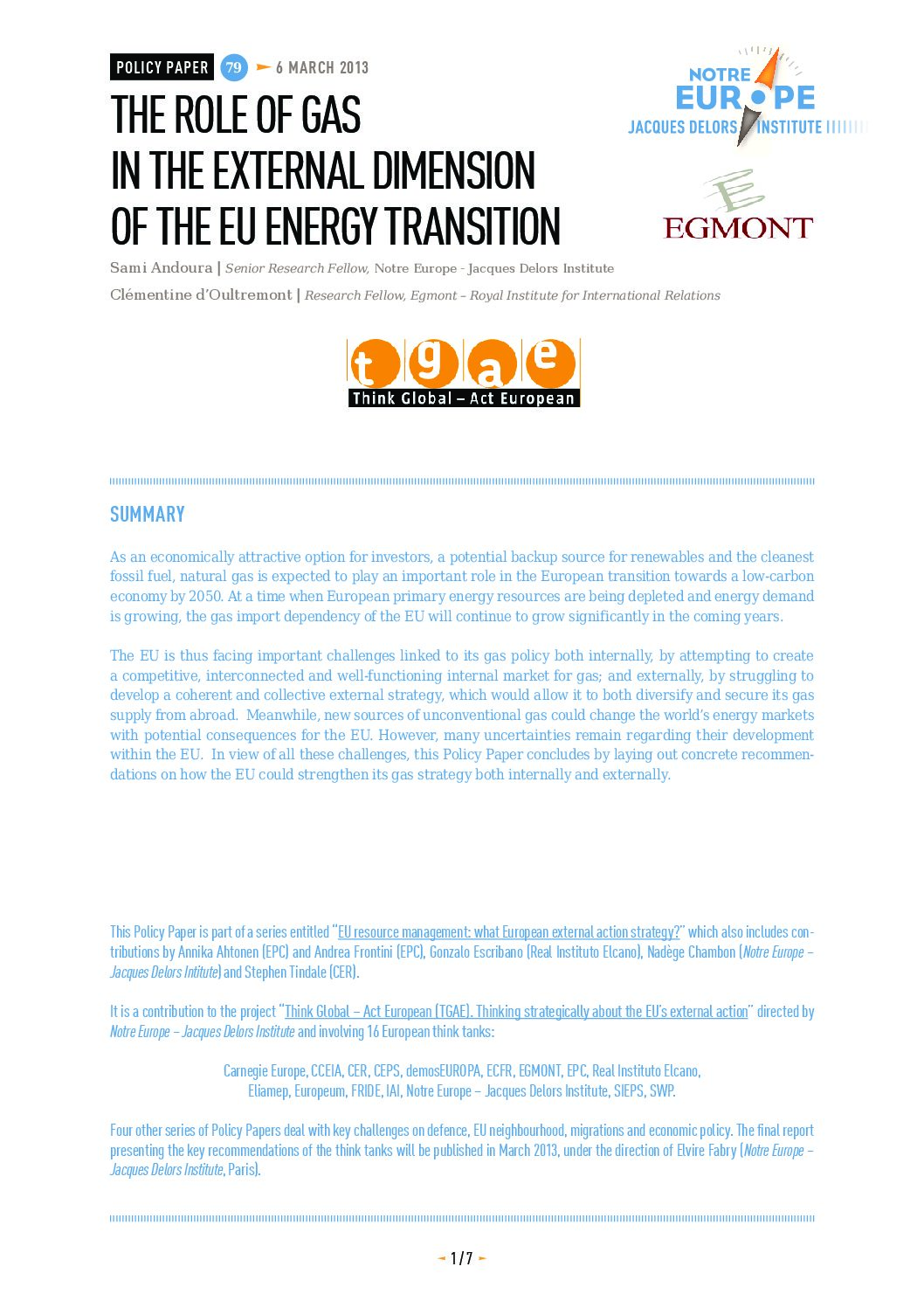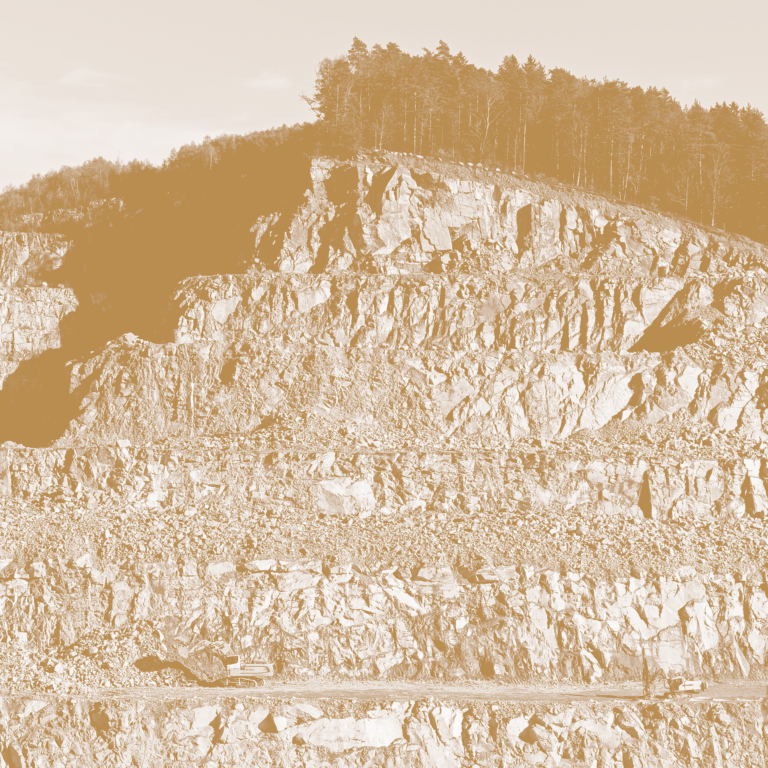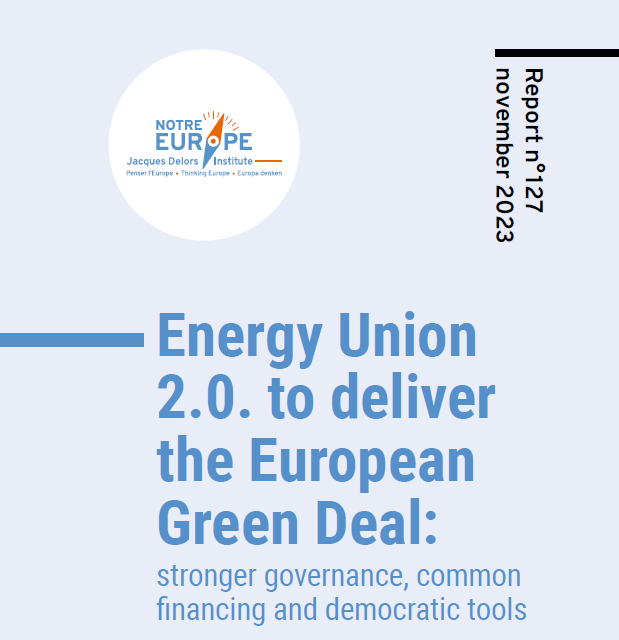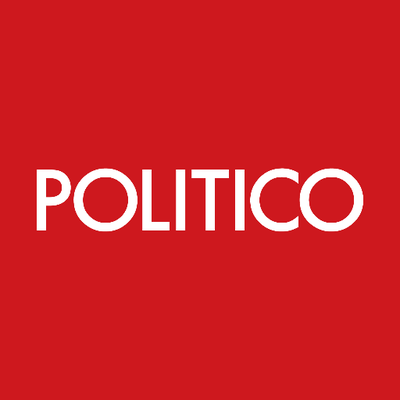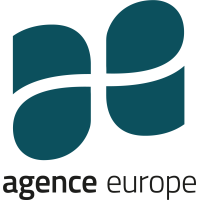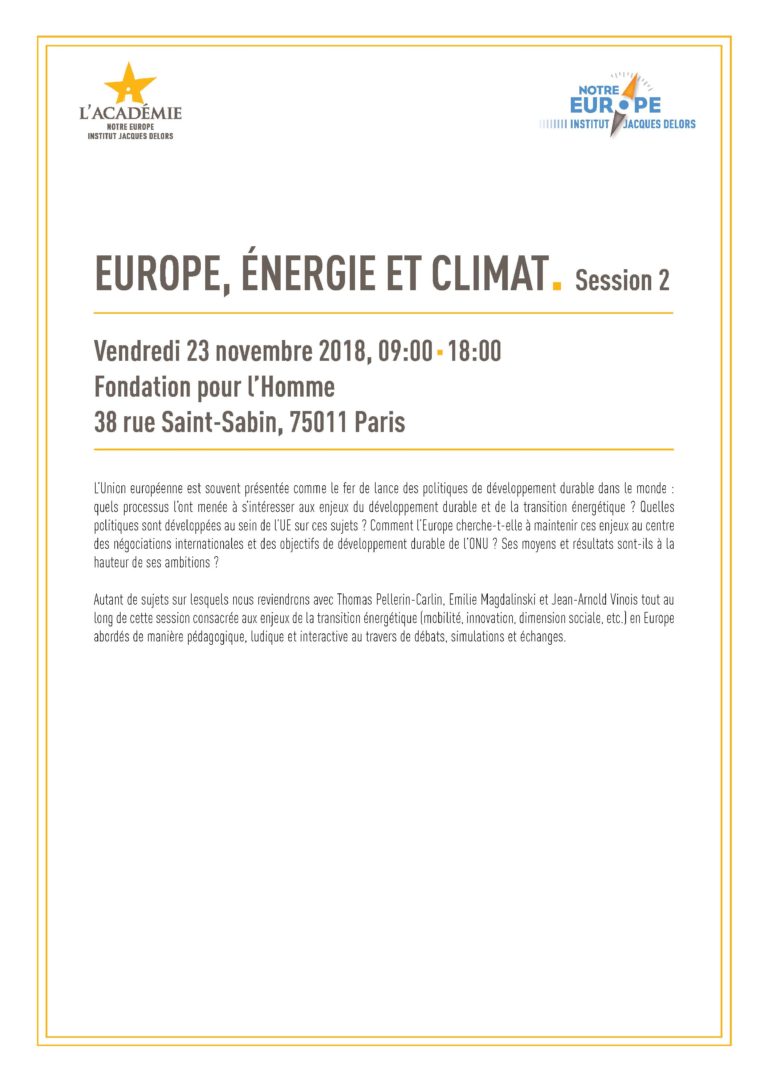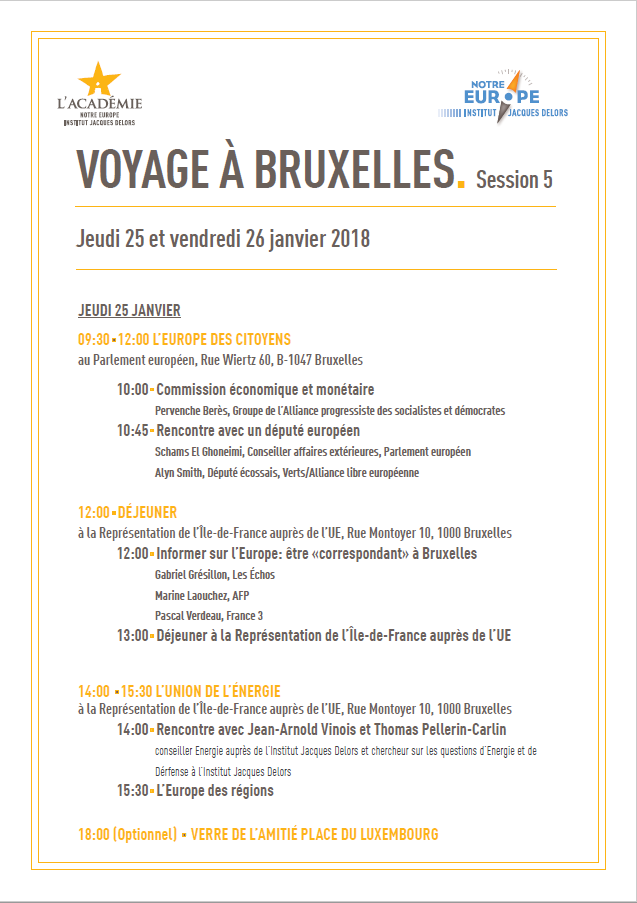Policy Paper 79
Le rôle du gaz dans la dimension exterieure de la transition énergétique européenne
Sami Andoura, Senior Research Fellow, Notre Europe – Jacques Delors Institute and Clémentine d’Oultremont, Researcher, Egmont ? As an economically attractive option for investors, a potential backup source for renewables and the cleanest fossil fuel, natural gas is expected to play an important role in the European transition towards a low-carbon economy by 2050. At a time when European primary energy resources are being depleted and energy demand is growing, natural gas is becoming increasingly important to the EU. Consequently, the gas import dependency of the EU will continue to grow significantly in the coming years. However, if the EU wants to achieve its energy transition by 2050, gas must be considered as a mid-term rather than a long-term solution.
The EU is facing important challenges linked to its gas policy both internally, by attempting to create a competitive, interconnected and well-functioning internal market for gas; and externally, by struggling to develop a coherent and collective external strategy, which would allow it to both diversify and secure its gas supply from abroad.
Disponible en anglais uniquement
Ce Policy
Paper est une contribution de Sami Andoura (Notre Europe – Jacques Delors Institute) et Clémentine d’Oultremont (Egmont) au
projet Think Global – Act European (TGAE). Thinking Strategically
about the EU’s external action dirigé par Notre Europe – Institut
Jacques Delors (rapport disponible en mars 2013, dir. Elvire Fabry,
Chercheur Senior, Notre Europe – Institut Jacques Delors).
As an economically attractive
option for investors, a potential backup source for renewables and the cleanest
fossil fuel, natural gas is expected to play an important role in the European
transition towards a low-carbon economy by 2050. At a time when European
primary energy resources are being depleted and energy demand is growing,
natural gas is becoming increasingly important to the EU. Consequently, the gas
import dependency of the EU will continue to grow significantly in the coming
years. However, if the EU wants to achieve its energy transition by 2050, gas
must be considered as a mid-term rather than a long-term solution.
The EU is facing important
challenges linked to its gas policy both internally, by attempting to create a
competitive, interconnected and well-functioning internal market for gas; and
externally, by struggling to develop a coherent and collective external
strategy, which would allow it to both diversify and secure its gas supply from
abroad.
Meanwhile, new sources of
unconventional gas could change the world’s energy markets with potential
consequences for the EU. However, many uncertainties remain regarding the
development of unconventional gas within the EU, especially on negative
environmental and climate impacts.
In view of all these challenges, it is crucial that
the EU clarifies its strategy regarding gas in the aim of improving its
security of supply and pursuing its efforts against climate change. This paper
will conclude by laying out concrete recommendations on how the EU could
strengthen its strategy with regard to gas.
publication du rapport final présentant les recommandations clés des16 think tanks mobilisés dans ce projet, 5 séries
de Policy Papers portent sur les sujets suivants : Migration, Voisinage de l’UE, PSDC,Ressources stratégiques et Politiques économiques (publication le 12 Mars).
Ce Policy Paper
fait partie de la série intitulée «Ressources Stratégiques de l’UE: quelle action extérieure européenne?» qui
comprend les contributions de Gonzalo Escribano (Elcano), Annika Ahtonen et Andrea Frontini (EPC), Nadège Chambon (Notre Europe – Jacques Delors Institute)et Stephen Tindale (CER).
Voir les
autres contributions de la série ressources stratégiques >>
Ce projet est mené avec le soutien du 
SUR LE MÊME THÈME
ON THE SAME THEME
PUBLICATIONS
Résilience des chaînes de valeurs des matériaux critiques en France

Union de l’énergie 2.0. pour mettre en place le pacte vert européen

Emplois et compétences vertes dans l’UE

MÉDIAS
MEDIAS
« L’Europe a besoin d’une nouvelle stratégie commune de sécurité énergétique »

Enrico Letta is thinking about funding for the green transition

L’Institut Jacques Delors présente un nouveau rapport pour une union européenne de l’énergie 2.0

ÉVÉNEMENTS
EVENTS
Euroquestions #69 | Pour une Union de l’énergie 2.0. pour réaliser le Pacte vert

Conférence Jacques Delors 2023 – La transition écologique

Webinaire « Perspectives franco-allemandes : Économie de l’énergie » [EN]

Euroquestions | Relations franco-allemandes : 2023, année de la relance ?

Le budget 2023 permet-il aux Français de faire face à la crise énergétique ?

Euroquestions | Quid de la précarité énergétique en Europe et de ses enjeux à l’heure de l’inflation ?

Tables rondes sur les nouvelles perspectives du gaz pour l’UE [EN]

L’approvisionnement énergétique de l’UE au défi de la géopolitique et de l’environnement

Euroquestions | Embargo sur les énergies fossiles russes : comment l’Europe peut-elle arrêter de financer la guerre de Poutine à l’Ukraine ? [EN]

Mon Europe à moi #1 – Géopolitique de l’énergie : l’Union face à l’enjeu climatique

Les politiques de relance verte en Europe

Conférence européenne EnerGreenDeal [ENG]

Les Rencontres du Développement Durable 2021

Table Ronde : “La politique européenne de l’énergie à l’heure du changement climatique”

2020 virtual Outermost regions Forum | “Together for a sustainable future”

Comment garantir une relance verte et juste ?

Euroquestions | Relance et puissance : mots d’ordre de la rentrée européenne

Wébinaire | Préparer un avenir propre et résilient pour les villes européennes

Webinar | Greener After – A Green Recovery Stimulus for a post-COVID-19 Europe

Annulé : L’urgence climatique, un défi aussi pour les villes d’Europe

Revoir la conférence
Energising the Green Deal

Académie Notre Europe n°2 – L’Europe verte

Paris, 5 novembre 2019 – Comment financer l’innovation énergétique en Europe afin d’atteindre la neutralité carbone en 2050 ?

Paris, 17 octobre 2019 – Une gouvernance de la transition énergétique pour une meilleure sécurité énergétique en Europe

Webinaire 1 – Green Deal & innovation énergétique. Ce que la Commission devrait faire durant les 100 premiers jours

Bruxelles, 26 septembre 2019 – Conférence finale ENABLE.EU : « Enabling the Energy Transition »

Paris, 5 septembre 2019 – Forum Mondial Convergences

Bruxelles, 27 juin 2019 – Women Rule Summit 2019

Paris, 21 juin 2019 – Citoyens et consommateurs européens : comment s’approprier la transition énergétique ?

Bruxelles, 20 juin 2019 – EUSEW : Qu’est-ce que les consommateurs approuvent ? Les bonnes pratiques et outils

Bruxelles, 18 juin 2019 – Des finances soutenables pour l’innovation et l’efficacité énergétique

Bruxelles, 24 mai 2019 – La recherche et l’innovation comme boussole pour le futur que nous voulons

Paris, 14 mai 2019 — Le rendez-vous ParisMat

Paris, 14 mai 2019 – Revitaliser l’industrie européenne par la transition énergétique

Nantes, 8 mai 2019 — Chauffage urbain et climatisation pour tous : inclure les citoyens, les clients et les consommateurs

Paris, 16 avril 2019 — Élections européennes : bilan et propositions des candidats pour le climat

Paris, 11 avril 2019 — Les sciences sociales dans la transition énergétique : quel appui de l’Union européenne ?

Bruxelles, 4 avril 2019 — Les services d’intérêt général dans les transitions numérique et énergétique

Malmö, 27 mars 2019 – Conférence d’hiver sur l’énergie

Berlin, 20 mars 2019 – New Paradigm Workshop : Changement climatique, quel potentiel pour les actions transnationales ?

Berlin, 6 mars 2019 — European Climate Initiative (EUKI) – Groupe de travail : le rôle de l’innovation dans le secteur de la mobilité

Paris, 19 février 2019 – Si le climat était une banque, on l’aurait déjà sauvé. Qu’est-ce qu’on attend ?

Bruxelles, 7 février 2019 — La décarbonisation de l’énergie : leçons du passé et politiques pour le futur

Dunkerque, 23 janvier 2019 – Assises européennes de la transition énergétique

Katowice, 13 décembre 2018 – COP24 : Yes Europe !

Katowice, 6 décembre 2018 – COP24 : La transition énergétique mondiale, options politiques, sociétales et technologiques

Paris, 4 décembre 2018 – Transition écologique et Union européenne : quels leviers face à l’urgence ?

Paris, 29 novembre 2018 – Comment accélérer le financement de la lutte contre les changements climatiques, en France et en Europe ?

Paris, 29 novembre 2018 – Light up the Economy ! Quand coopérer devient la clé de tous les succès

Berlin, 27 novembre 2018 – Innover, un défi vital pour la transition énergétique

Paris, 23 novembre 2018 – Session n°2 de l’Académie Notre Europe : Europe, énergie, climat

Paris, 20 novembre 2018 – Comment accompagner la transition bas-carbone pour qu’elle soit juste ?

Neuilly-sur-Seine, 15 novembre 2018 – Dérèglement climatique : quelles solutions énergétiques pour l’Europe ?

Haguenau, 25 octobre 2018 – Exprimez-vous sur l’Europe !

Paris, 22 octobre 2018 – Consultation citoyenne avec les collaborateurs d’Engie, sur l’avenir de l’Europe de l’énergie

Bruxelles, 11 octobre 2018 – Financer l’investissement pour contribuer au leadership et la compétitivité de l’UE pour le climat

Bruxelles, 3 octobre 2018 – L’Europe a besoin d’un pacte social pour la transition énergétique

Tallinn, 27 et 28 septembre 2018 – Nordic Baltic Energy Conference

Bruxelles, 22 septembre 2018 – Consultation citoyenne : l’Europe de l’énergie

Berlin, 7 septembre 2018 – Table-ronde « Quo vadis de l’Union de l’énergie »

Bruges, 12 juillet 2018 – Négocier l’Union de l’énergie

Bruges, 12 juillet 2018 – Juste une transition ou une juste transition ? Emplois, compétences et pauvreté énergétique

Bruges, 3 juillet 2018 – Négocier l’Union de l’énergie

Bruges, 2 juillet 2018 – Introduction à l’Union de l’énergie

Bruxelles, 28 juin 2018 – Faire de la lutte contre le changement climatique le fondement d’une société durable et prospère

Sofia, 14 juin 2018 – Atelier d’expert : les pratiques énergétiques des Européens

Sofia, 13 juin 2018 – Atelier : échanges sur les systèmes de chauffage et de climatisation et sur le concept de « Consomma’cteurs »

Sofia, 12 juin 2018 – 4e point d’étape du projet ENABLE.EU

Bruxelles, 7 juin 2018 – Apprentissage par l’expérience et l’inclusion des citoyens : deux manières d’améliorer l’élaboration des politiques énergétiques

Bruxelles, 6 juin 2018 – La transition énergétique : quel rôle pour l’Union européenne ?

Paris, 25 mai 2018 – Académie Notre Europe : l’Europe verte et citoyenne

Madrid, 23 mai 2018 – Le rôle des banques nationales de développement dans le financement climatique

Florence, 10 mai 2018 – Ère digitale, la transition énergétique européenne : lancement d’un « Knowledge Hub »

Florence, 10 mai 2018 – Nouvelles formes de marchés et de solidarités dans le monde énergétique européen

Bruxelles, 24 avril 2018 – Géopolitique et nécessité d’une transition vers une énergie plus propre

Bruxelles, 19 mars 2018 – Dialogue On Europe, conférence de clôture

Barcelone, 16 mars 2018 – Les engagements mondiaux sur le changement climatique

Bruxelles, 14 mars 2018 – Le leadership européen dans un environnement mondial compétitif

Bruxelles, 7 mars 2018 – Groupe d’étude sur l’état de l’Union de l’énergie

Bruxelles, 1er mars 2018 – Participation des citoyens à la transition énergétique

Bruxelles, 21 février 2018 – Soutenir les start-ups et petites et moyennes entreprises dans la transition énergétique

Bruxelles, 25 janvier 2018 – Voyage d’étude de l’Académie à Bruxelles

Bruxelles, 25 octobre 2017 – Pénultième débat sur le gaz russe en Europe

Bruxelles, 19 octobre 2017 – Conférence d’Eurométeaux

Paris, 5 octobre 2017 – La transition énergétique de l’Union européenne

Bruges, 13 juillet 2017 – Quelle transition ? Emplois, compétences, pauvreté énergétique

Budapest, 30 mai 2017 – L’intégration du marché de l’énergie 2.0 dans les pays de l’Europe du Sud-Est

Bruxelles, 19 janvier 2017 – Positions nationales sur l’Union de l’Energie

Paris, 18 janvier 2017 – La réforme du marché européen de l’électricité

Paris, 18 Novembre 2016 – L’Union de l’Energie est-il un projet nouveau et ambitieux?

Bombay, 15-16 septembre 2016 – Lessons from the european energy transition

Paris, 12 juillet 2016 – La réforme du marché européen de l’électricité

Berlin, 29 juin 2016 – L’Europe à l’épreuve de la transition énergétique

Milan, 21 Juin – Union de l’Energie : la super grille européenne










